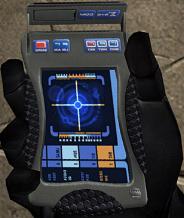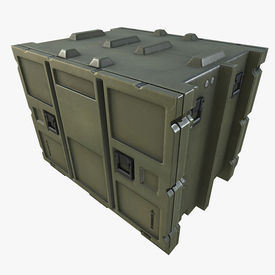Victory Marines/Shadow's Equipment
| USS Victory | ||
|---|---|---|
 NPC STATUS VESSEL | ||
| ||
Marine Weapons and Equipment Regulations
Non-combat
A Starfleet Marine assigned to a duty post will wear their:
- Standard Duty Uniform
- Marine Combat Knife (concealed)
Combat
When involved in combat operations, a Marine will wear their:
- Standard Duty Uniform
- Body Armor
- Helmet
- ISARAS
- Combat Tricorder
- Marine Combat Knife
- Marine Aquila
- Kits/Extra Weapons
Marine Equipment Descriptions
ISARAS
The Integrated Search and Rescue Armour System (ISARAS) is a modular armoured vest system based on the Crye and CIRAS systems of 21st century Earth, designed specifically for the varied duty requirements of the SAR Team. The vest itself provides superior protection from physical attack as well as substantial protection from most energy-based weapons fire.
The ISARAS can be fitted with numerous pouches and clips and customized to the individual wearer and their role on the SAR Team. For example, an engineer may have -- in addition to the phaser holster standard on all configurations -- a tricorder pouch and various tool and equipment pouches/clips, while a medical officer would carry advanced medkits, hyposprays, etc. A marine participant may have the majority of their ISARAS dedicated to carrying weaponry and explosives, depending on the role the individual has been asked to fill.
Helmet & Body Armour
The Helmet is constructed with a hardened ballistic plastic, the CADM (Crystalline Ablative Dispersal Matrix) Ballistic Helmet is fitted with a retractable visor for a full seal. The helmet contains an advanced multi-function communications system. Operated by pupil tracking and a verbal shorthand, the Ballistic Helmet allows a Marine hands-free operation of the unit while concentrating on fighting and other attention-intensive tasks.
The helmet's multi-function communications system can send the Marine's coordinates to units nearby, perform mapping and navigation functions, and project command and mission data on the visor. It also includes a helmet-to-helmet infrared communications link, allowing discrete, short distance communications between individual Marines while lessening the chances of interception, communications signal encryption, as well incorporating standard combadge traffic.
The ballistic helmet's visor also operates as a data screen for the user's Combat Tricorder and other linked or integrated systems. The visor's systems open programming structure allows it to accept multiple signals and upgrades in the field. It also features a three hundred sixty degrees proximity and target/threat tracking display, low light vision enhancement with rapid polarization, and audio enhancement/suppression to prevent disorientation. Sensory enhancements and protections can be modified to accommodate different species' sensory requirements; although after a certain point of acuity, the helmet is configured to allow a Marine's senses to work without the helmet's interference.
Each Marine's helmet is equipped and programmed to assist them in tasks specific to their position and MOS such as target designation, range finding, and chemical analysis. Officers and NCOs get units with more processing power and a broader range of capabilities and command functions, including signal interception, analytical functions, and troop status readouts.
The helmet can be modified to fit the ergonomic, mission, and, to a limited extent, the aesthetic needs of the individual Marine.
Personal protection for a Marine in combat operations is essential. Marine Body Armor is designed to provide a balance between protection and weight. The body armor is separated into upper body and lower body protective gear. The Marine Body Armor consists of the same CADM (Crystalline Ablative Dispersal Matrix) that is utilized in the Marine Ballistic Helmet. The protective vest contains remote biomonitors, which measure the wearer’s health, and a personal transport inhibitor designed to prevent enemies from using transporters against Marine units.
Hazard Team Duty Uniform
In certain circumstances, wearing a standard Starfleet duty uniform is not practical. In such instances, Hazard Teams can choose to wear a specially-designed duty uniform known as the HDU. The HDU is made of a lightweight, but extraordinarily durable synthetic fibre that is highly resistant to heat, cold and tearing. The HDU is also a temperature-regulating fabric, allowing its wearing to better adapt to extreme temperatures and/or rapid change in temperature.
Combat Tri-Corder
The combat tricorder is a specialized tricorder carried by Starfleet Marines. Along with its basic tricorder functions, the combat tricorder is programmed with strategic and tactical information and countermeasures. The combat tricorder links with the Ballistic Helmet for combat operations.
SAR Gear Box (3 Onboard)
- Tricorders and PADDs – 4x medical and 4x standard.
- 10x First aid kits with equipment such as dermal regenerators, bone knitters, painkillers and other drugs and equipment needed to adequately treat patients at the scene.
- 12x Flashlights, 10x power packs, 4x grappling gear, 6x heavy duty wiring and ropes, 12x survival packs (and rations), 2x heavy cutting gear, 4x harnesses, 6x underwater breathing apparatus, 10x spades and 10x pickaxes, flares, 8x pattern enhancers.
Hazard Gear Box (3 Onboard)
- Tricorders – Combat and standard.
- 12x Aquilas, 4x Type 33 CQC, 2x Engineering Kits, 2x Science Kits, 2x Medical Kits, 4x Each Grenade and Combat Shields.
- 12x Body Armour, 12x Helmets and 12x ISARAS
Command Center Box (1 Onboard)
- 1x Command Unit comparison of mobile sensor unit, minilab, small armoury, 2x computer station with multi use and enhanced comm array.







